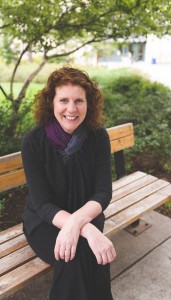How your college student’s definition of family may expand at the university level.
By Molly McGaughey
 Families with college students are always striving to find a new relationship equilibrium. How much to communicate and how much detail to share about daily life and relationships is probably still in flux for many of you.
Families with college students are always striving to find a new relationship equilibrium. How much to communicate and how much detail to share about daily life and relationships is probably still in flux for many of you.
Most of you should be familiar with K-State’s use of the word “family” to describe our campus community. I must admit that I both like and dislike this. Being literal I point out that Larry Moeder is my boss, not my uncle (even though for years many admissions representatives have called him “Uncle Larry”). And what about people from families that have struggled in the past to find harmony? Does the word “family” mean the same thing to them as it does others?
But, year after year, I hear students express that this campus is truly more friendly than others they visit. And season after season I see deep friendships develop that result in daily interactions, spontaneous or planned adventures and shared milestones. A devotion develops.
Last year, a student said he felt like the whole K-State experience was related to the walk-on phenomenon of our football team. He said, “Come for the chance. Stay for the family.”
In the first weeks of the fall semester, I helped host lunches for students new to campus. We asked how they felt about the “family” thing. Overwhelmingly, these students expressed feelings of belonging and said that they felt supported. Wildcat Warmup, Week of Welcome, and many academic programs were mentioned specifically. So, beyond interpersonal interactions, even our institutionally planned events are increasing feelings of connection. Hooray!
Insights from Psychology
Yet I’m still left to question what differentiates peers, friends and family from one another. In his authoritative text on emerging adolescents, “Adolescence and Emerging Adulthood,” Jeffrey Jensen Arnett cites Thomas Berndt, who explains the types of support that friends offer[i]:
- Informational support — giving advice and guidance across relationships, academics and other life challenges.
- Instrumental support — helping with tasks and lending things.
- Companionship support — being reliable in social activities.
- Esteem support — congratulating successes and supporting through disappointments.
Building on research set forth by W.H.J. Meeus, Arnett also goes on to explain that romantic relationships (boyfriends or girlfriends) can offer this same support.[ii] But my focus here is on friends and family — can’t family offer this same support? Yes, of course! Do friends who offer this same support become a kind of pseudo-family? They do. They really do. And this isn’t a new development. This stage of life – leaving home for the first time and making adult decisions – has always benefitted from supportive friendships.
What to Do
One way to connect to your student is to ask about your son’s or daughter’s friends. People often self-select friends who have a lot of similarities to themselves. Getting to know a little about the friendships that are developing is a window into your student’s life. Similarly, invitations for friends to visit your home or to go out to dinner if you are visiting campus can show your appreciation for these friendships (even if they aren’t accepted).
Be cautious, however. Trying to be “one of the girls” or to enter the “bro zone” isn’t advisable. Digging for information shouldn’t be on the menu either. Ask yourself if you are genuinely curious about these friends as people and these friendships. If so, ask questions or extend invitations from that positive place. Don’t forget to also ask how your son or daughter is being a good friend. It’s never too late to offer that kind of reminder.
A Community Approach
Family is defined differently by different people. I think what K-State is striving to be, and is succeeding at in so many ways, is an ever more supportive community. We want to cheer each other on and “have each other’s backs,” as Dr. Bosco says when discussing campus safety. As part of our extended community, you can expand this culture and affirm it.
To the many of you who have already done so, kudos! Contact us at pfa@k-state.edu to share your stories of what you learned or gained by opening your heart or home to a K-State friend.
[i] Arnett, Jeffrey (2013). Adolescence and Emerging Adulthood (pp. 221). New York: Pearson.
[ii]Arnett, Jeffrey (2013). Adolescence and Emerging Adulthood (pp. 222). New York: Pearson.
About the author
Molly McGaughey has worked in a variety of capacities in Admissions at Kansas State beginning in 2006. She graduated from K-State the first time with a B.S. in History in 1995, added a graduate certificate in Public Administration, and an M.S. in Family Studies and Human Services more recently. This master’s program focused on positive youth development from age 10 to 20. Modern psychology, sociology, and educational research offers a new perspective on the teenage years.